10 Benefits of Big Data Strategy Consulting for Analysts

10 Benefits of Big Data Strategy Consulting for Analysts
Overview
This article presents ten key benefits of big data strategy consulting for analysts, highlighting its significance in enhancing decision-making, improving data accuracy, and fostering a competitive edge.
Features: Big data strategy consulting offers tailored data strategies and collaborative environments. These features are crucial as they enable organizations to harness the full potential of their data resources.
Advantages: By implementing these strategies, businesses can achieve actionable insights and operational efficiency. This not only streamlines processes but also positions companies to respond swiftly to market changes.
Benefits: Ultimately, these advantages lead to significant business growth. How can your organization leverage these insights to drive success?
Each benefit is supported by evidence that illustrates how effective data strategies can transform operations. For instance, companies that adopt a data-driven approach often see improved accuracy in their reporting and analytics. This accuracy is vital for making informed decisions that can propel a business forward.
In conclusion, embracing big data strategy consulting can be a game-changer for analysts. It not only enhances their ability to make data-driven decisions but also contributes to the overall growth and competitiveness of the organization. What steps can you take today to integrate these strategies into your work?
Introduction
In today’s world, data is often referred to as the new oil, and organizations are increasingly recognizing the significant impact of big data strategy consulting. By utilizing high-quality datasets and advanced analytical techniques, businesses can gain valuable insights that not only inform decision-making but also create a competitive edge. But as the data landscape evolves, how can companies effectively navigate the complexities of big data to remain relevant and thrive?
This article delves into ten compelling benefits of big data strategy consulting, illustrating how analysts can harness these insights to drive their organizations toward success. By understanding the features and advantages of big data, companies can unlock its full potential and reap the benefits that come with informed strategies.
Initial Data Offering: Access to High-Quality Datasets for Informed Decision-Making
The Initial Data Offering acts as a centralized hub, providing market research analysts with access to a diverse range of high-quality datasets essential for informed decision-making in 2025. This platform simplifies the search for relevant information across various fields, including finance, social media, and environmental studies. By offering unique datasets tailored to specific needs, it enhances analytical capabilities. High-quality datasets are vital in big data strategy consulting; they empower analysts to extract actionable insights, which ultimately support strategic decisions that drive business success.
Centralized information platforms play a crucial role in decision-making by establishing a single source of truth. This unification enables easier access, management, and analysis of information. Industry specialists emphasize that the goal of centralizing information is to ensure it is unified, accessible, and reliable, thereby improving the overall quality of insights derived from data. Successful implementations of information marketplaces, such as those seen in companies leveraging insights for customer personalization and operational efficiency, showcase the transformative potential of centralized information access.
In a landscape where 60% of organizations are integrating AI and machine learning into their operations, the ability to swiftly access and analyze high-quality datasets becomes increasingly critical. Analysts equipped with the right tools and information can enhance forecasting accuracy and improve overall business performance. This reinforces the importance of a metrics-focused approach in today’s competitive environment.
How can these datasets apply to your work? Consider the potential for improved decision-making and strategic planning. By leveraging high-quality datasets, organizations can enhance their analytical capabilities and utilize big data strategy consulting to drive significant business outcomes.
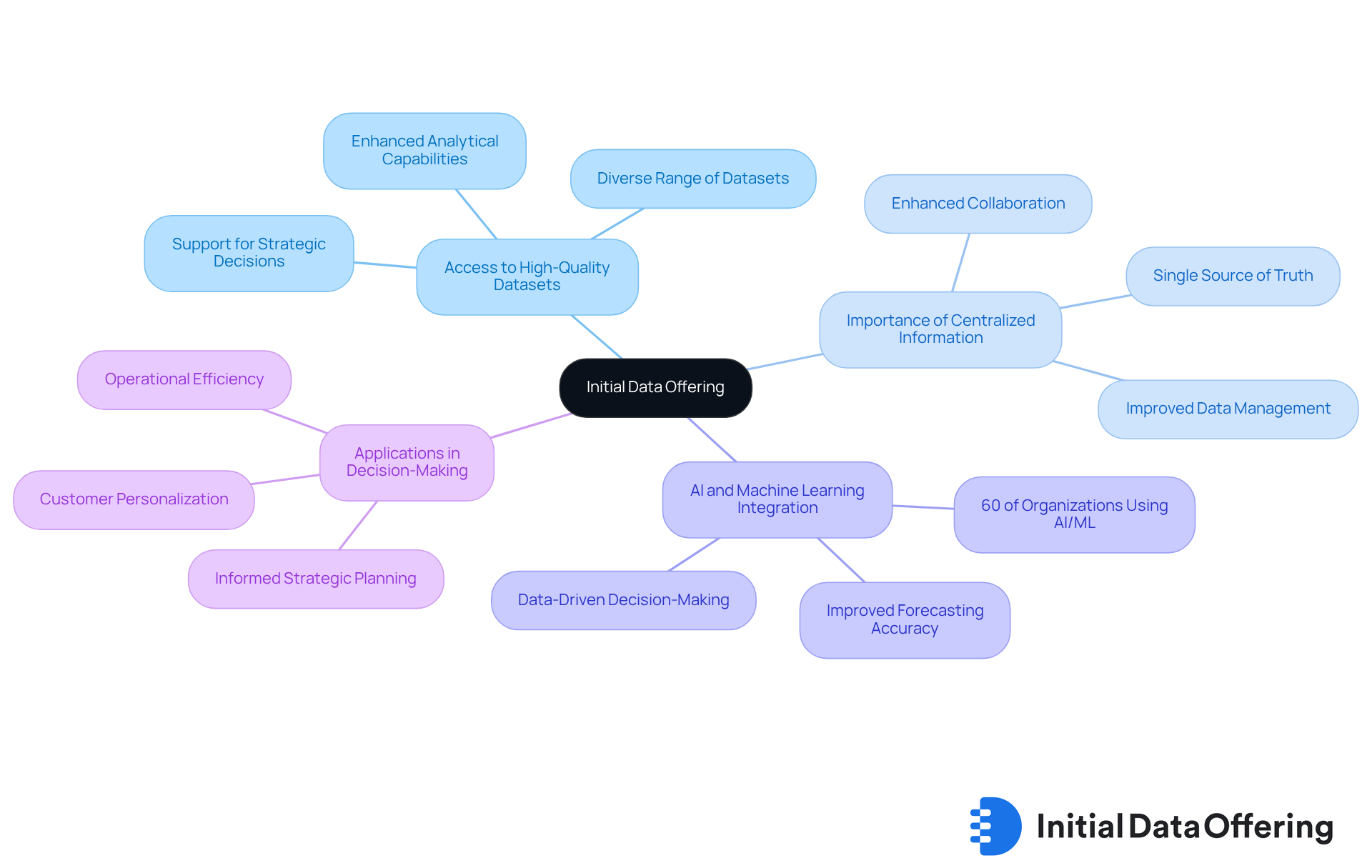
Enhanced Data Accuracy: Improve Reliability in Market Insights
A robust information strategy consulting service is vital for enhancing accuracy, which is essential for generating trustworthy market insights. By implementing strict validation procedures and utilizing advanced analytics tools, analysts can significantly improve the integrity of the insights derived from their data. This reliability is not merely advantageous; it is crucial for informed business decision-making and for maintaining stakeholder trust in the findings presented.
Consider firms that have adopted comprehensive information validation methods. They have reported enhanced market insights, allowing them to navigate complex market dynamics more effectively. The integration of machine learning models into information validation processes has proven to elevate quality, reduce error rates, and minimize manual intervention, thereby streamlining the analytical workflow.
As organizations increasingly recognize the importance of information accuracy, they are investing in these validation processes. This investment ensures that their market insights are not only actionable but also reliable, ultimately leading to improved strategic outcomes. How might your organization benefit from adopting similar validation practices? By prioritizing data integrity, you can enhance decision-making and foster greater trust among stakeholders.
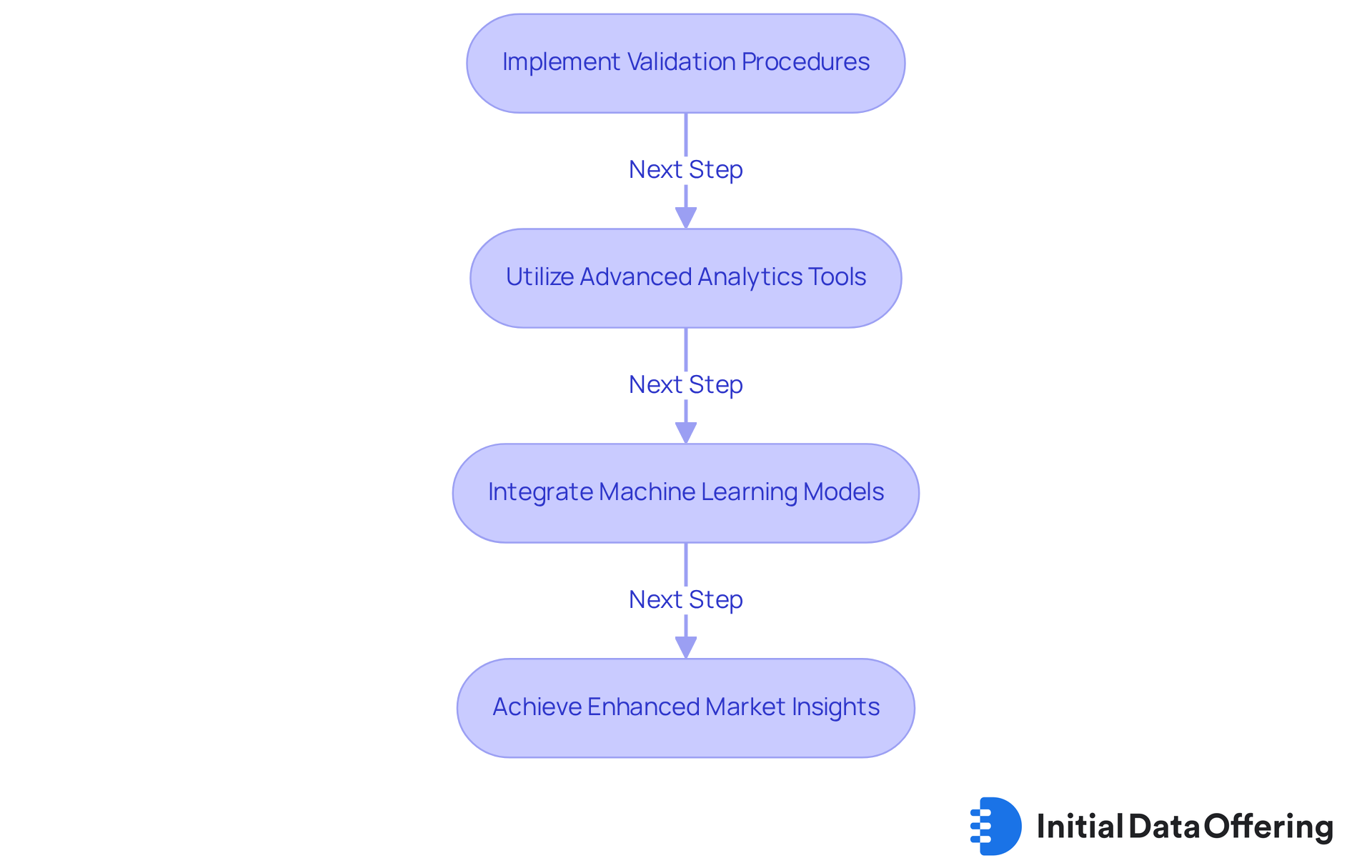
Streamlined Data Interpretation: Simplify Complex Data Sets for Better Analysis
Simplifying information interpretation is crucial in today’s data-driven world. Utilizing visualization tools and analytical frameworks can transform complex datasets into understandable insights. These methods, including information aggregation, filtering, and visualization, empower analysts to swiftly recognize trends and patterns.
By streamlining the analysis process, analysts can focus on extracting actionable insights rather than feeling overwhelmed by intricate data. Have you ever found yourself lost in a sea of numbers? With the right tools, you can navigate through the complexities and uncover valuable information that drives decision-making.
The benefits of these approaches are clear: they not only enhance understanding but also improve efficiency in data analysis. As you consider how these techniques can apply to your work, think about the potential for increased productivity and better outcomes. Embracing these strategies can lead to more informed decisions and a clearer path forward.
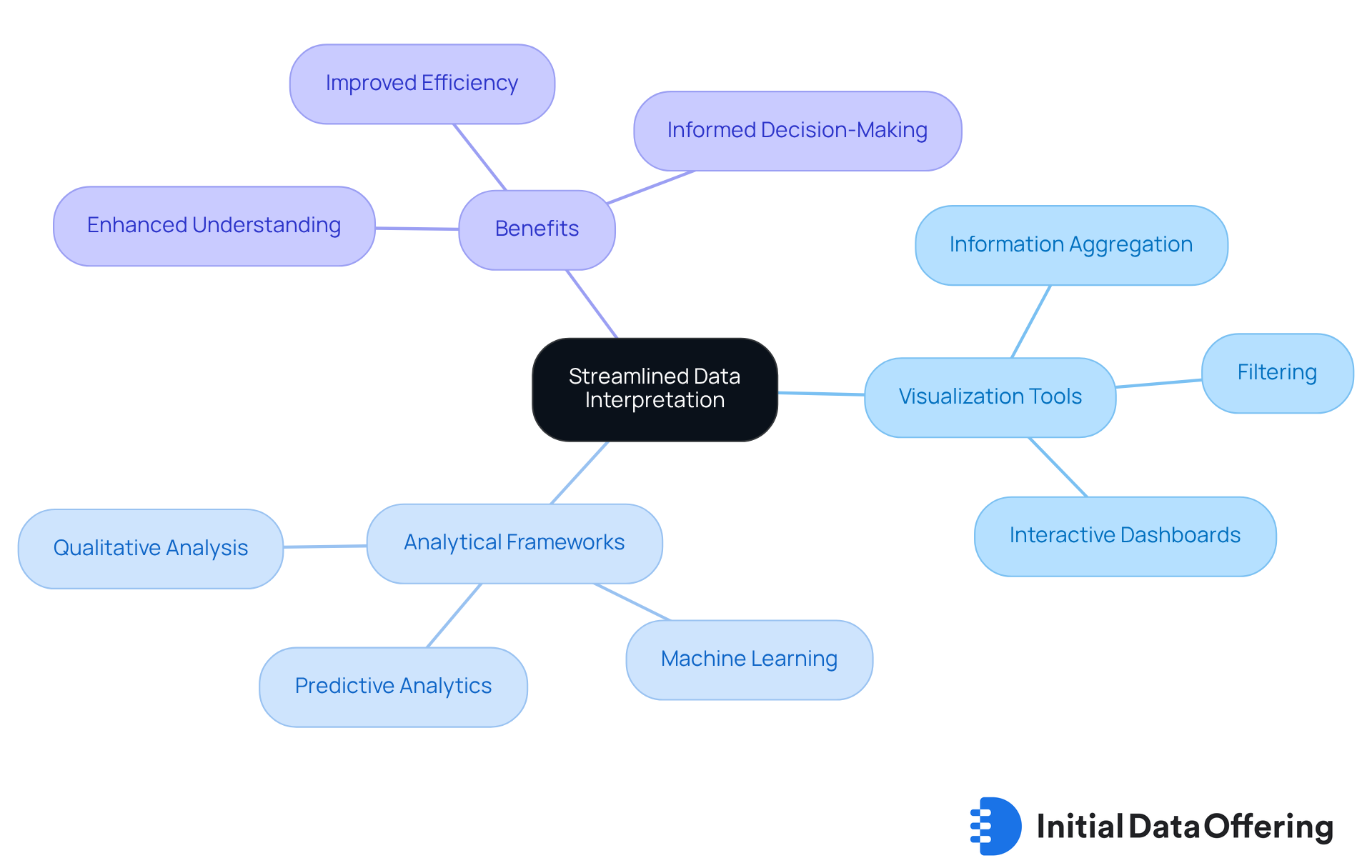
Stronger Competitive Advantage: Leverage Big Data for Market Leadership
Large-scale analytics provide companies with a significant competitive edge. This process transcends mere information gathering; it involves comprehensive analysis through big data strategy consulting to derive actionable insights that inform strategic decisions. Companies adept at harnessing extensive data sets can not only anticipate market shifts but also gain deeper insights into consumer behavior by utilizing big data strategy consulting, thereby optimizing their operations in the process. For instance, businesses that leverage large data sets have reported an 8% increase in profits and a 10% reduction in expenses, illustrating the tangible benefits of analytics-driven strategies. Moreover, 63% of marketers have ramped up their investments in big data strategy consulting, acknowledging its vital role in effectively targeting relevant audiences. Additionally, 69% of companies utilizing large data sets have indicated improved strategic decision-making, further underscoring the advantages of big data strategy consulting.
Case studies reinforce this trend:
- Red Roof Inn utilized analytics to enhance its marketing strategies during adverse weather conditions, resulting in a 10% increase in turnover.
- Similarly, Corel Software achieved remarkable 106% revenue growth by analyzing customer purchasing patterns, demonstrating the power of data in shaping business strategies.
As Tim Berners-Lee aptly noted, 'Data is a precious thing and will last longer than the systems themselves.' This statement underscores the importance for companies to not only collect data but also master its application, ensuring they stay ahead in their industries. By implementing robust information strategies, companies can enhance their big data strategy consulting to position themselves as industry leaders, fostering innovation and achieving sustainable growth.
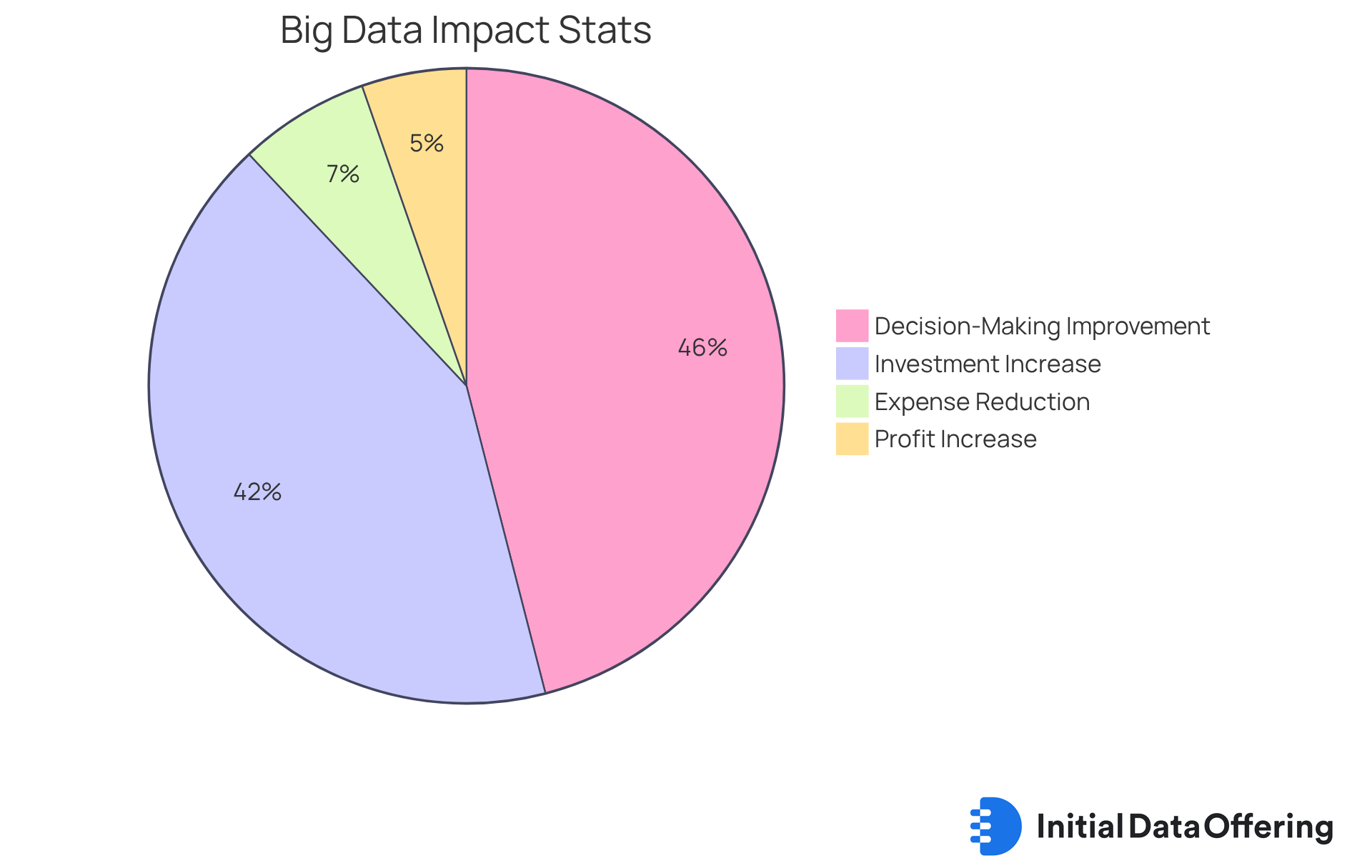
Predictive Analytics: Anticipate Market Trends with Data-Driven Insights
Predictive analytics plays a crucial role in helping analysts anticipate future market trends by thoroughly examining historical data patterns. This approach combines statistical models with advanced machine learning algorithms, allowing organizations to extract valuable insights into potential future outcomes. The advantage of this analytical foresight is that it enables companies to make informed, proactive decisions—whether they are refining marketing strategies or optimizing inventory levels. As a result, businesses can enhance operational performance and boost customer satisfaction, positioning themselves for success in a competitive landscape.
The predictive analytics market is projected to reach USD 82.35 billion by 2030, underscoring the undeniable importance of these tools. Furthermore, over 55% of businesses are expected to adopt AI-powered predictive analytics tools by 2025, highlighting a significant shift towards data-driven decision-making. As Carly Fiorina wisely stated, 'The aim is to convert information into knowledge, and knowledge into insight.' This shift is particularly evident in industries such as finance, retail, and utilities, where predictive analytics is increasingly utilized to drive strategic initiatives.
To effectively implement predictive analytics, analysts should begin by identifying essential business inquiries. Ensuring the quality of information is vital to support accurate predictions. By focusing on these foundational elements, organizations can leverage predictive analytics to not only anticipate market trends but also to make strategic decisions that foster growth and innovation. How might your organization benefit from adopting predictive analytics tools?
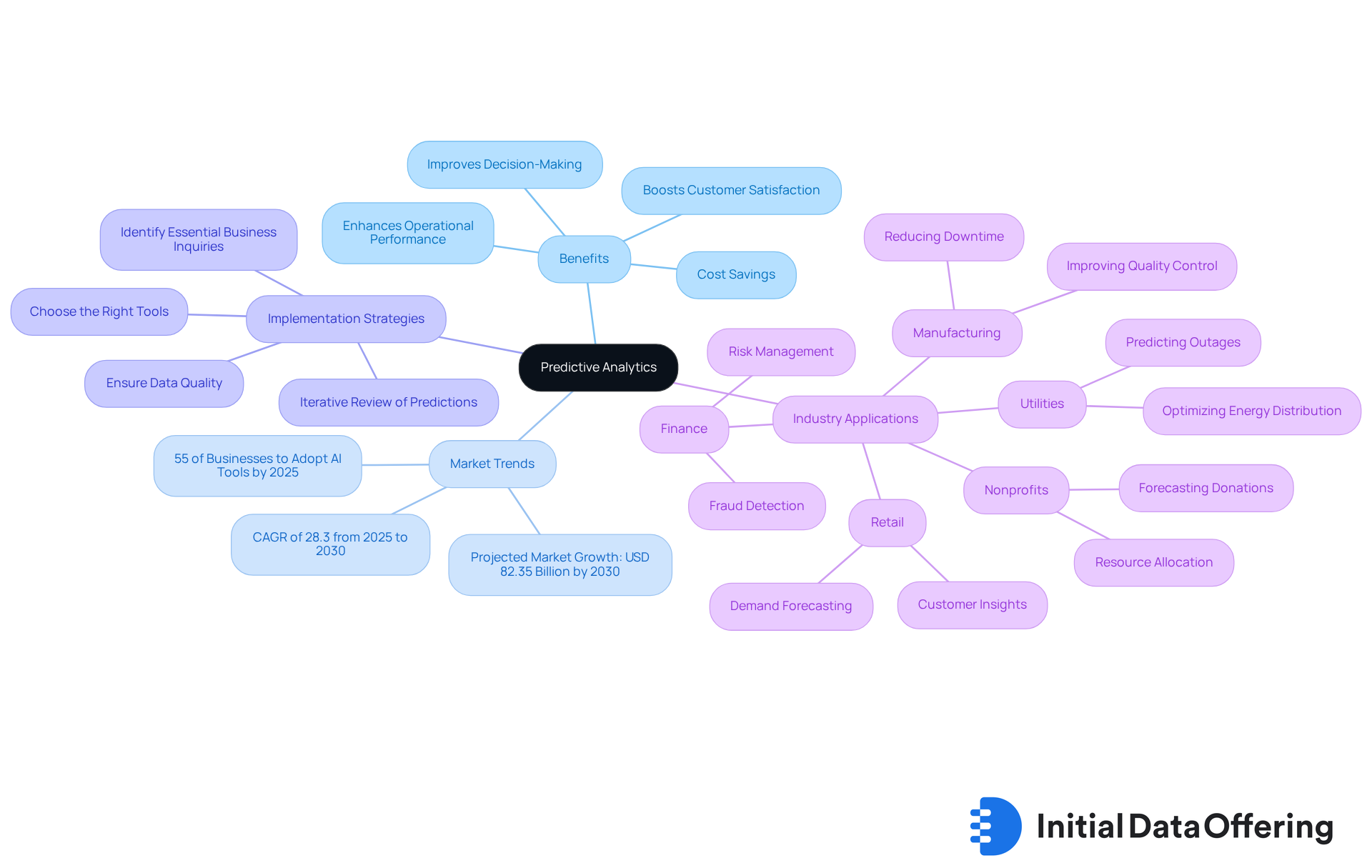
Robust Data Governance: Ensure Compliance and Ethical Standards
Implementing strong information governance practices is essential for organizations aiming to comply with legal and ethical standards. This involves establishing comprehensive policies for information management, security, and usage. By prioritizing information governance, businesses can protect sensitive details, improve quality, and establish trust among stakeholders.
In today’s information-driven environment, effective governance not only reduces risks but also enables entities to utilize information as a strategic resource. Current trends suggest that organizations are increasingly embracing AI-driven governance solutions, which incorporate compliance measures directly into information management processes. This shift transforms governance from a simple requirement into a competitive edge, allowing businesses to navigate intricate regulatory landscapes while promoting ethical information practices.
For instance, organizations that integrate governance into their operations report notably enhanced compliance results and decreased risks related to breaches. Moreover, insights from privacy specialists highlight the significance of ethical standards in information management. They stress that organizations must remain vigilant in their governance efforts to uphold customer trust and address changing regulatory requirements.
By 2025, unstructured information is anticipated to represent over 90% of global enterprise information, emphasizing the necessity for clear governance strategies. Additionally, the typical expense of a breach in 2023 reached $4.45 million, underscoring the financial dangers of insufficient governance. Establishing an ethical culture of compliance is a high priority, as entities that utilize AI and automation can detect and manage breaches nearly 100 days faster on average.
As the compliance landscape for 2024 evolves and becomes more complex, robust governance practices are more critical than ever. How prepared is your organization to adapt to these changes? By focusing on strong governance, you can not only mitigate risks but also leverage information as a valuable asset.
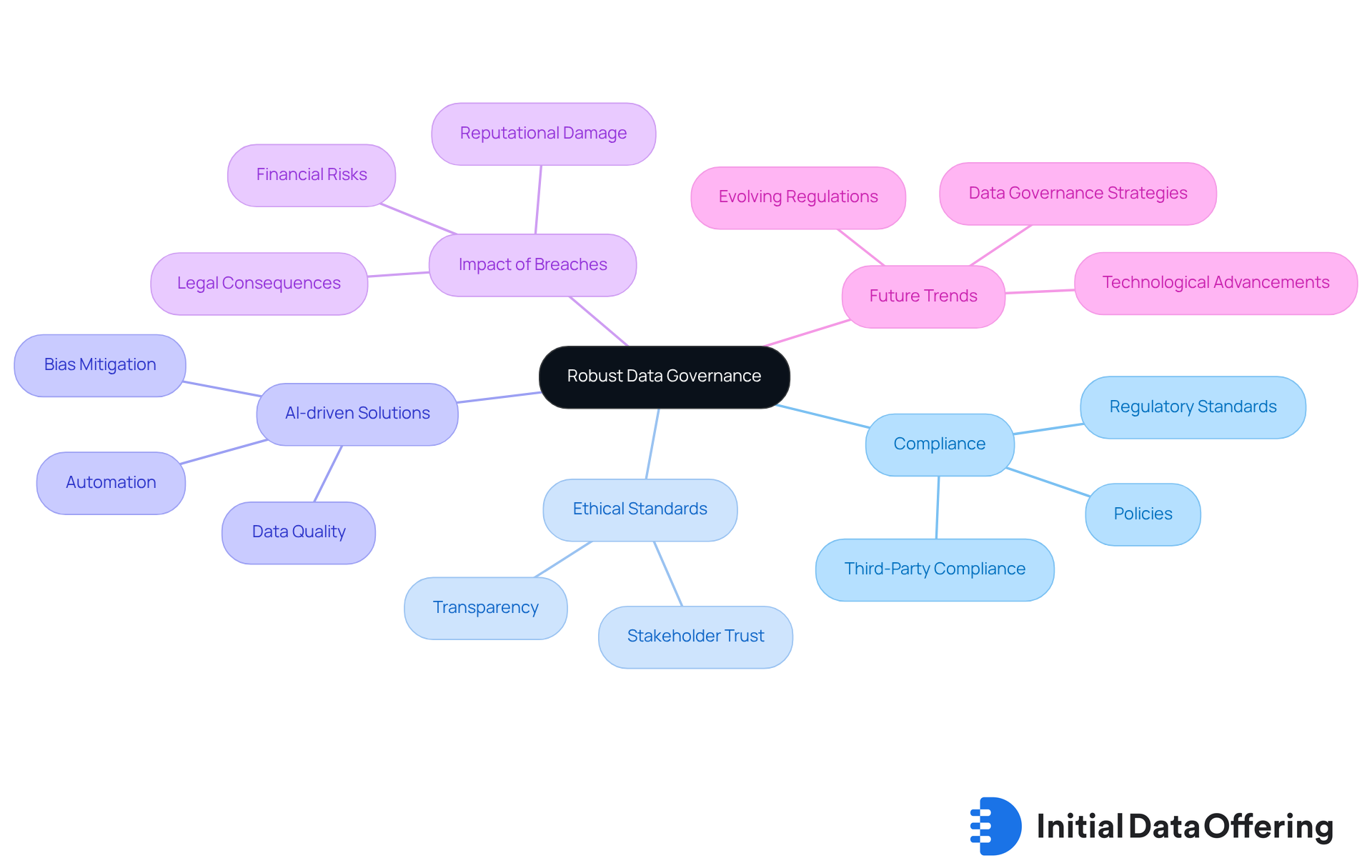
Scalable Solutions: Adapt Big Data Strategies to Evolving Market Needs
Scalable large-scale solutions are essential for organizations looking to adapt their information strategies with the help of big data strategy consulting as market demands evolve. What does this mean for your organization? This flexibility is crucial for managing increasing information volumes and diverse analytical needs. By investing in scalable technologies and frameworks, organizations can ensure their information infrastructure not only supports growth but also enhances their big data strategy consulting to foster innovation.
Consider the advantages: With a robust scalable solution, your organization can respond effectively to new opportunities and challenges. This adaptability allows for seamless integration of new data sources and analytical tools, enhancing decision-making processes. Ultimately, the benefit of implementing big data strategy consulting lies in the ability to stay competitive in a rapidly changing market landscape.
In summary, embracing scalable solutions through big data strategy consulting is not just a technical upgrade; it's a strategic move that positions your organization for future success. How can you leverage these technologies to enhance your operations?
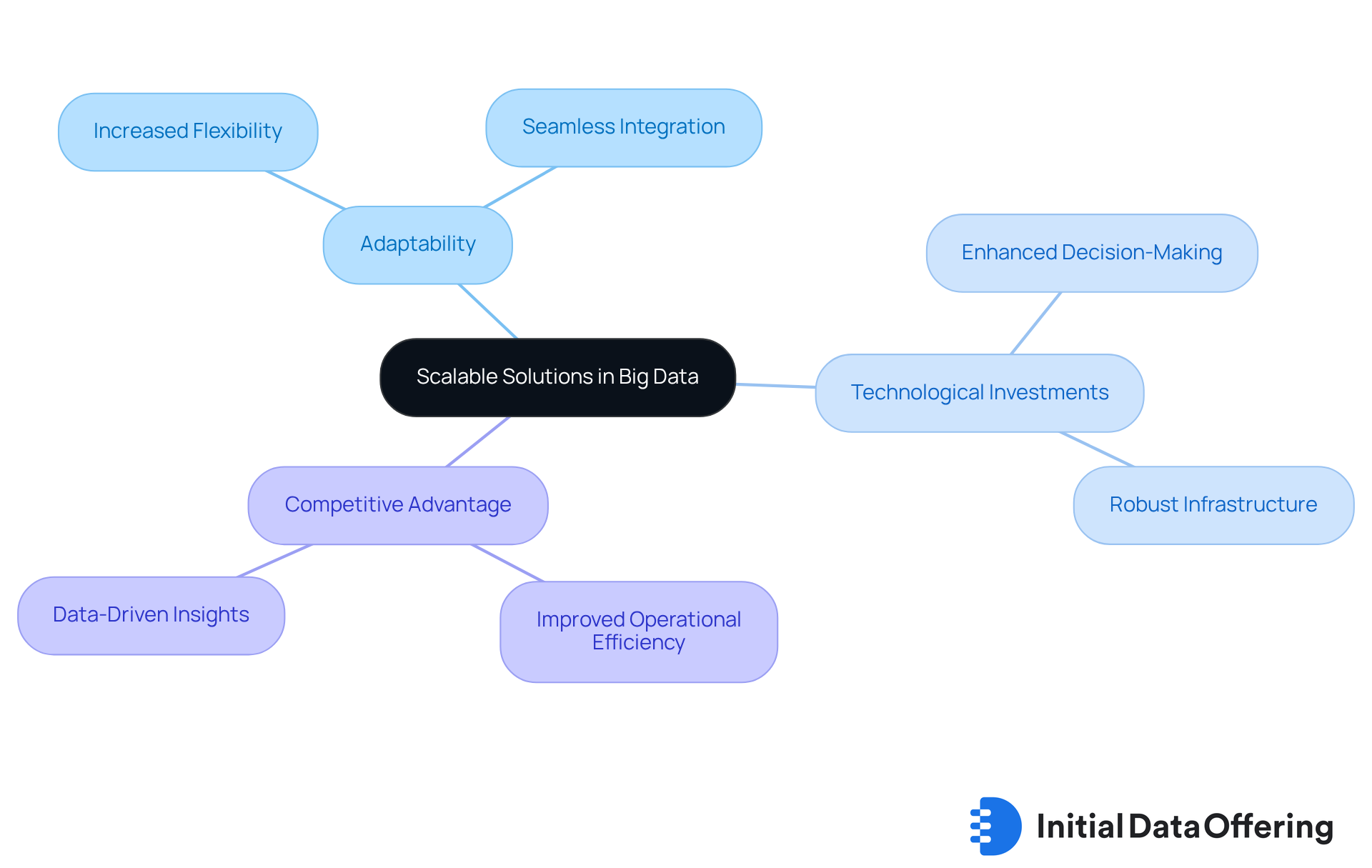
Customized Data Strategies: Tailor Solutions for Business Growth
Tailoring information strategies enables organizations to align their initiatives with specific objectives. This alignment ensures that every insight-driven effort contributes to overall goals. The process begins with a comprehensive evaluation of the organization's distinct requirements, allowing for the creation of information solutions that are both relevant and impactful.
For example, companies that implement customized information solutions often report measurable improvements in performance metrics, such as customer retention and revenue growth. Statistics reveal that organizations utilizing large information sets experienced an 8% rise in profit and a 10% decrease in expenses. This highlights the effectiveness of these tailored approaches. As Geoffrey Moore aptly states, "data is absolutely crucial to making intelligent decisions in enterprises."
Moreover, entities that prioritize information quality and governance frameworks are better equipped to ensure that their tailored information strategies yield valuable insights. By focusing on personalization, companies can fully harness the potential of their information, leading to enhanced operational efficiency and sustainable growth.
Furthermore, organizations that successfully integrate information initiatives with their strategic goals are more prepared to navigate market challenges and seize emerging opportunities. A notable example is The North Face, which leverages consumer information through its mobile application to provide customized experiences. This showcases the tangible benefits of personalized solutions.
How might your organization benefit from implementing tailored information strategies? Consider the potential for improved performance and growth.
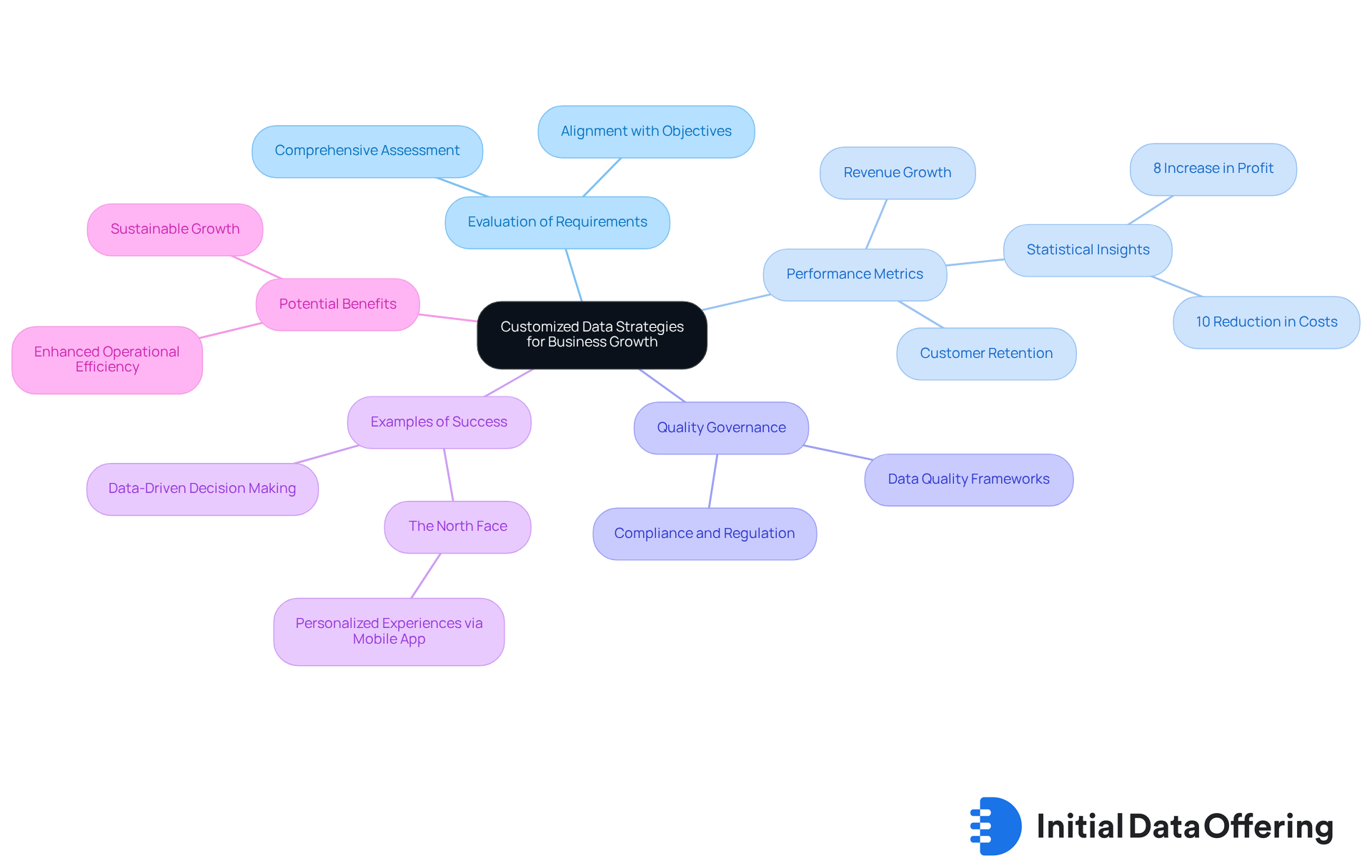
Actionable Metrics: Drive Informed Decision-Making with Big Data Insights
Focusing on actionable metrics allows organizations to transform data insights into informed decisions. By identifying key performance indicators (KPIs) that align with business goals, analysts can ensure their findings lead to concrete actions. This strategic approach not only improves decision-making but also fosters a culture of accountability and continuous improvement within the organization.
For example, companies that effectively utilize KPIs report an average revenue increase of 8% and a cost reduction of 10%, as demonstrated in a case study on data-driven strategies. With 91% of companies recognizing the importance of data-driven decision-making, the ability to identify and apply relevant KPIs is essential for achieving strategic objectives. How can your organization benefit from this insight?
Analysts emphasize that establishing clear, measurable KPIs is vital for tracking progress and promoting organizational success, especially as the landscape evolves in 2025. As Peter Drucker wisely noted, "You can’t manage what you can’t measure," highlighting the indispensable role of KPIs. However, it’s crucial to acknowledge that while 50% of all business decisions depend on information, only half of the available data is utilized, posing a challenge for many companies.
William Bruce Cameron's observation, "Not everything that can be counted counts, and not everything that counts can be counted," underscores the necessity for a thoughtful selection of metrics. By focusing on the right KPIs, organizations can navigate these challenges and drive meaningful outcomes.
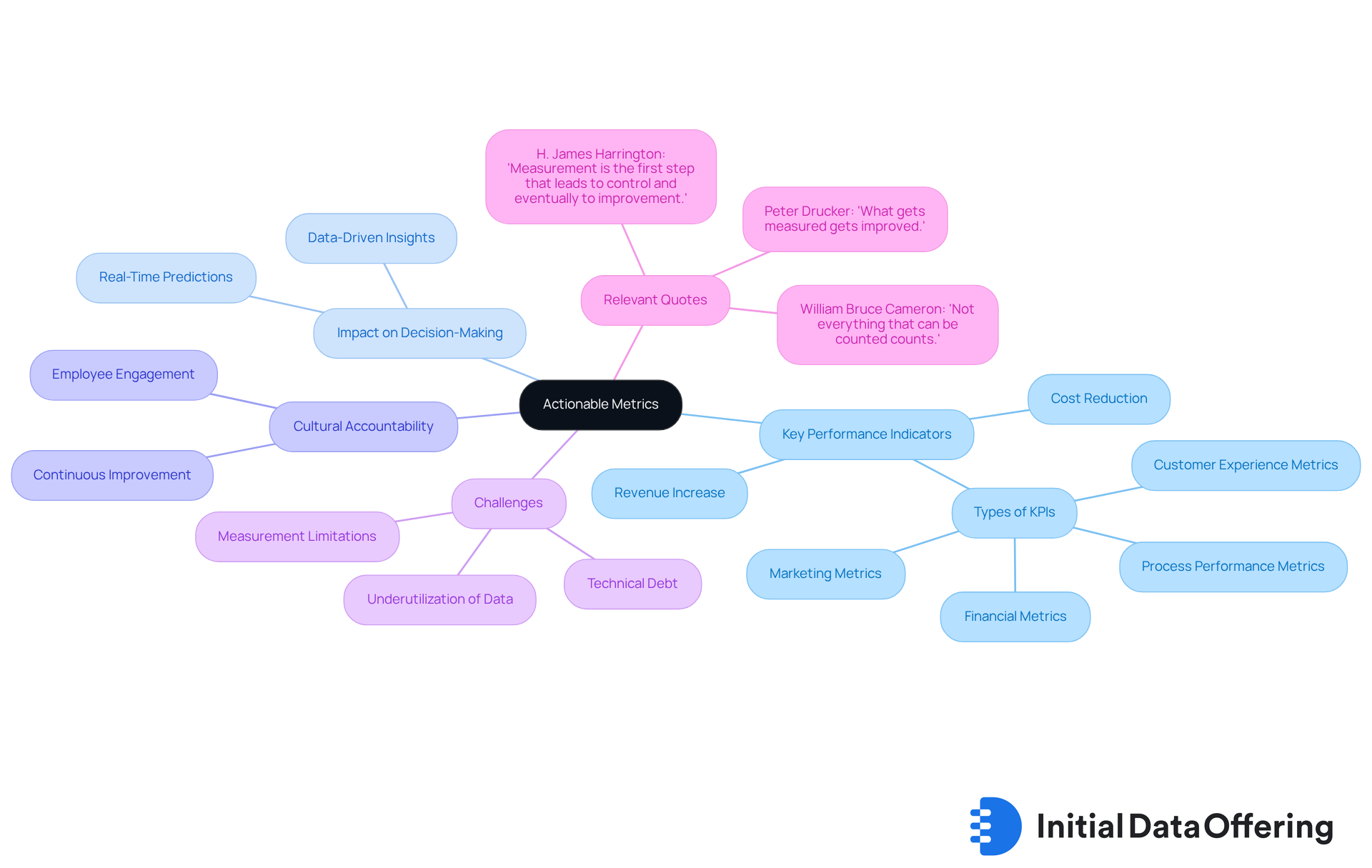
Collaborative Environment: Foster Teamwork through Data Strategy Consulting
Establishing a cooperative atmosphere is vital for improving information consulting. Cross-functional teamwork allows organizations to leverage diverse viewpoints and skills, significantly enhancing information initiatives. This collaboration not only improves the quality of insights produced but also fosters innovation and ensures efficient execution of strategies across the enterprise.
For instance, organizations that actively engage cross-functional teams report a 42% stronger talent pipeline and experience technology adoption rates that are 34% higher than those with siloed approaches. Furthermore, leaders highlight that collaboration among departments can lead to a 50% increase in innovation. These statistics showcase the tangible benefits of a unified approach. As noted by Harvard Business Review, "teams make better decisions 87% of the time compared to individuals," reinforcing the value of collaborative efforts.
Additionally, Wellstar Health System's experience illustrates that jointly developed success metrics for AI implementation resulted in doubled adoption rates compared to previous technology rollouts. By promoting a culture of collaboration and implementing regular cross-functional huddles, organizations can better navigate the complexities of big data strategy consulting and achieve impactful outcomes.
How might your organization benefit from fostering such collaboration?
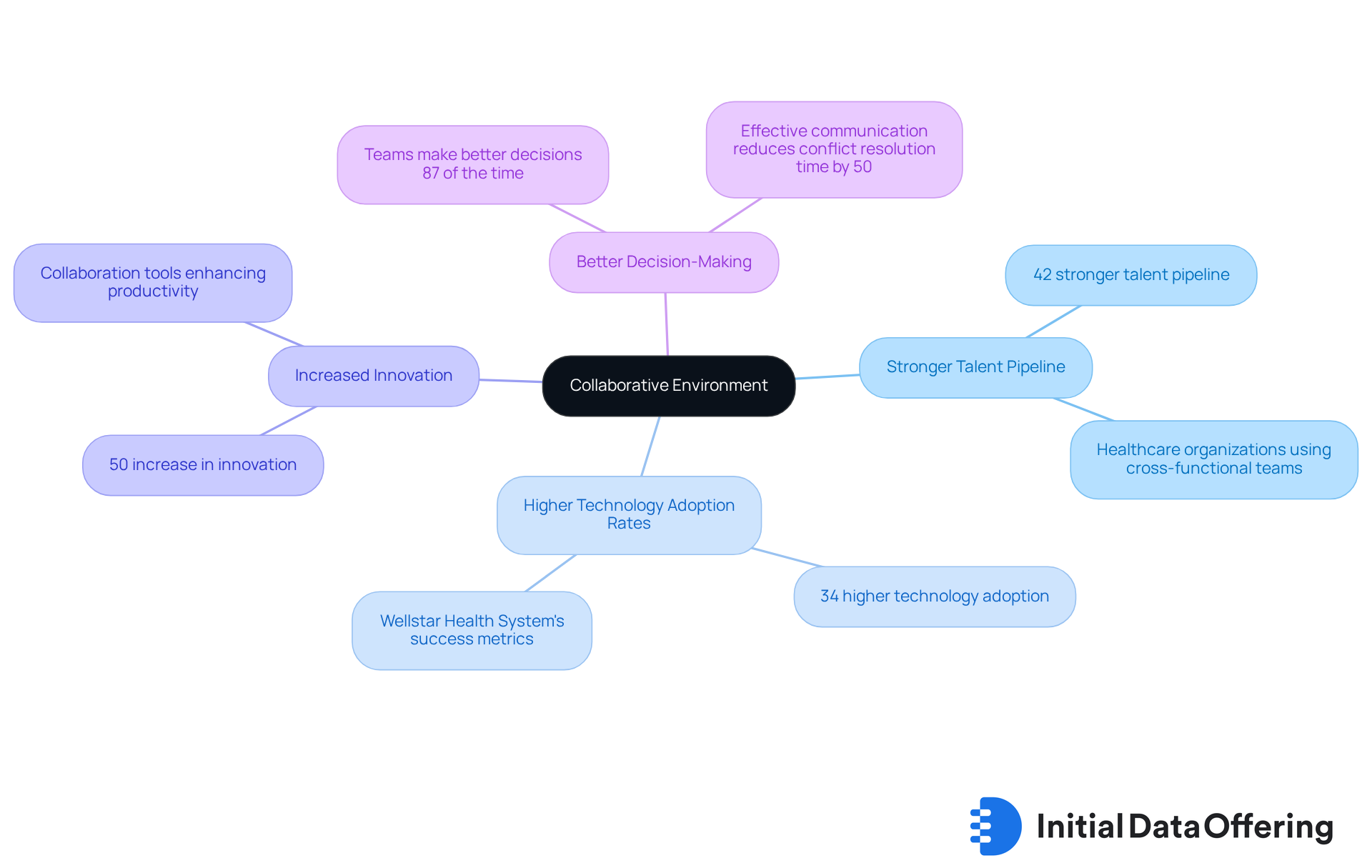
Conclusion
Embracing a robust big data strategy consulting framework offers analysts numerous benefits that can significantly enhance decision-making processes and drive business growth. What if organizations could leverage high-quality datasets to improve their analytical capabilities? By ensuring that insights are not only actionable but also reliable, businesses can navigate complex datasets and extract meaningful trends that inform strategic initiatives. This focus on data integrity and streamlined interpretation empowers analysts to make informed decisions.
The article highlights key advantages of big data strategy consulting, including:
- Enhanced data accuracy
- Predictive analytics for anticipating market trends
- Robust data governance practices that ensure compliance and ethical standards
These elements work together to provide organizations with a competitive edge, enabling them to adapt to evolving market demands. How can these insights foster innovation and sustainable growth? The emphasis on collaborative environments further underscores the importance of teamwork in maximizing the potential of data-driven insights.
Ultimately, the significance of big data strategy consulting cannot be overstated. Organizations that invest in these practices are not only better equipped to address current challenges but are also poised to seize emerging opportunities in the marketplace. By prioritizing high-quality data, implementing scalable solutions, and fostering collaboration, businesses can position themselves as leaders in their industries. Is your organization ready to drive success through informed decision-making and strategic foresight?
Frequently Asked Questions
What is the Initial Data Offering?
The Initial Data Offering is a centralized hub that provides market research analysts with access to a diverse range of high-quality datasets, essential for informed decision-making in 2025.
How does the Initial Data Offering enhance analytical capabilities?
It offers unique datasets tailored to specific needs, simplifying the search for relevant information across various fields such as finance, social media, and environmental studies, which empowers analysts to extract actionable insights.
Why are high-quality datasets important in big data strategy consulting?
High-quality datasets are vital as they enable analysts to derive actionable insights that support strategic decisions, ultimately driving business success.
What role do centralized information platforms play in decision-making?
Centralized information platforms establish a single source of truth, making information unified, accessible, and reliable, which improves the quality of insights derived from data.
How are organizations integrating AI and machine learning related to data access?
About 60% of organizations are integrating AI and machine learning into their operations, highlighting the need for swift access to high-quality datasets for improved forecasting accuracy and overall business performance.
What is the significance of enhanced data accuracy in market insights?
Enhanced data accuracy is crucial for generating trustworthy market insights, which are essential for informed business decision-making and maintaining stakeholder trust.
How can organizations improve the reliability of their market insights?
Organizations can improve reliability by implementing strict validation procedures and utilizing advanced analytics tools, which enhance the integrity of the insights derived from their data.
What benefits do visualization tools and analytical frameworks provide?
These tools simplify the interpretation of complex datasets, enabling analysts to recognize trends and patterns more easily, thus improving efficiency in data analysis.
How can simplifying information interpretation impact productivity?
By streamlining the analysis process, analysts can focus on extracting actionable insights rather than being overwhelmed by complex data, leading to increased productivity and better outcomes.